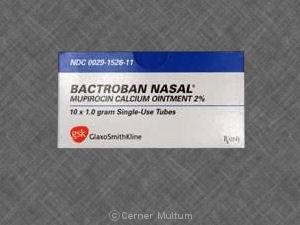What is the most important information I should know about mupirocin nasal?
Follow all directions on your medicine label and package. Tell each of your healthcare providers about all your medical conditions, allergies, and all medicines you use.
What is mupirocin nasal?
Mupirocin is an antibiotic that treats or prevents infection caused by bacteria.
Mupirocin nasal (for use in the nose) is used to treat bacteria in the nostrils of patients and healthcare workers during an outbreak of severe staph infection within a hospital or other medical setting. This can help prevent the growth of staph bacteria in patients with a high risk of infection.
Mupirocin nasal may also be used for purposes not listed in this medication guide.
What should I discuss with my healthcare provider before using mupirocin nasal?
You should not use this medicine if you are allergic to mupirocin.
It is not known whether this medicine will harm an unborn baby. Tell your doctor if you are pregnant.
It may not be safe to breast-feed a baby while you are using this medicine. Ask your doctor about any risks.
Mupirocin nasal is not approved for use by anyone younger than 12 years old.
How should I use mupirocin nasal?
Follow all directions on your prescription label and read all medication guides or instruction sheets. Use the medicine exactly as directed.
Do not take by mouth. Nasal medicine is for use only in the nose. If this medicine gets in your eyes or mouth, rinse with water.
Wash your hands before and after applying mupirocin nasal.
Use one half of the medicine from a single-use tube in each nostril, then throw the tube away.
With the ointment in your nostrils, gently press on the sides of your nose and rub for about 1 minute to help spread the ointment inside your nose.
Use this medicine for the full prescribed length of time, even if your symptoms quickly improve. Skipping doses can increase your risk of infection that is resistant to medication. Mupirocin will not treat a viral infection such as the flu or a common cold.
Store at room temperature away from moisture and heat. Do not refrigerate.
What happens if I miss a dose?
Use the medicine as soon as you can, but skip the missed dose if it is almost time for your next dose. Do not use two doses at one time.
What happens if I overdose?
An overdose of mupirocin nasal is not expected to be dangerous. Seek emergency medical attention or call the Poison Help line at 1-800-222-1222 if anyone has accidentally swallowed the medication.
What should I avoid while using mupirocin nasal?
Avoid getting this medicine in your eyes. If this does happen, rinse with water.
Do not use other nasal medications during treatment with mupirocin nasal unless your doctor tells you to.
What are the possible side effects of mupirocin nasal?
Get emergency medical help if you have signs of an allergic reaction: hives, skin rash; dizziness, fast or pounding heartbeats; wheezing, difficult breathing; swelling of your face, lips, tongue, or throat.
Stop using this medicine and call your doctor at once if you have:
- severe stomach pain, diarrhea that is watery or bloody;
- nosebleed; or
- severe itching, rash, or other irritation in your nose.
Common side effects may include:
- itching, burning, or stinging in your nose;
- runny or stuffy nose;
- altered sense of taste;
- headache;
- cough; or
- sore throat.
This is not a complete list of side effects and others may occur. Call your doctor for medical advice about side effects. You may report side effects to FDA at 1-800-FDA-1088.
What other drugs will affect mupirocin nasal?
Medicine used in the nose is not likely to be affected by other drugs you use. But many drugs can interact. Tell each of your healthcare providers about all medicines you use, including prescription and over-the-counter medicines, vitamins, and herbal products.
Where can I get more information?
Your pharmacist can provide more information about mupirocin nasal.
Remember, keep this and all other medicines out of the reach of children, never share your medicines with others, and use this medication only for the indication prescribed.
Every effort has been made to ensure that the information provided by Cerner Multum, Inc. ('Multum') is accurate, up-to-date, and complete, but no guarantee is made to that effect. Drug information contained herein may be time sensitive. Multum information has been compiled for use by healthcare practitioners and consumers in the United States and therefore Multum does not warrant that uses outside of the United States are appropriate, unless specifically indicated otherwise. Multum's drug information does not endorse drugs, diagnose patients or recommend therapy. Multum's drug information is an informational resource designed to assist licensed healthcare practitioners in caring for their patients and/or to serve consumers viewing this service as a supplement to, and not a substitute for, the expertise, skill, knowledge and judgment of healthcare practitioners. The absence of a warning for a given drug or drug combination in no way should be construed to indicate that the drug or drug combination is safe, effective or appropriate for any given patient. Multum does not assume any responsibility for any aspect of healthcare administered with the aid of information Multum provides. The information contained herein is not intended to cover all possible uses, directions, precautions, warnings, drug interactions, allergic reactions, or adverse effects. If you have questions about the drugs you are taking, check with your doctor, nurse or pharmacist.
Copyright 1996-2020 Cerner Multum, Inc. Version: 3.02. Revision date: 4/11/2018.

